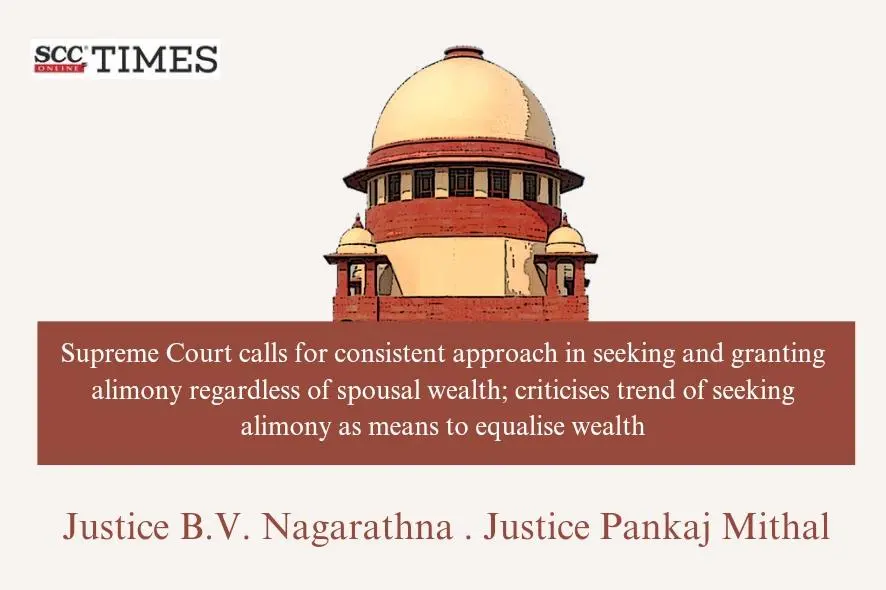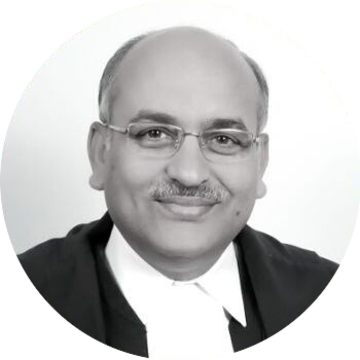Supreme Court: While deliberating over the instant petition filed by the wife under Section 25 of the Code of Civil Procedure, 1908 (CPC) seeking transfer of divorce petition from Family Court, Bhopal to Family Court, Pune; the Division Bench of B.V. Nagarathna* and Pankaj Mithal, JJ., had to consider whether the wife was entitled to the aforesaid relief, but also whether the Court, upon the application filed by the husband, can exercise its powers under Article 142(1) of the Constitution to grant a decree of divorce to the parties herein on the ground of irretrievable breakdown of marriage; if yes, then on what terms.
The Court allowed the application filed by the husband and exercising powers under Article 142, dissolved the marriage on grounds of irretrievable breakdown of marriage. The Court noted that the wife in the instant case has sought equalisation of status not just with the husband but also with his ex-wife and opined that this cannot be an acceptable approach. The fixation of alimony depends on various factors and there cannot be any straight-jacket formula for the same. The Court thus directed the husband to pay permanent alimony of Rs.12 Crores to the wife along with litigation fees amounting to Rs 3 Lakhs. The Court also directed the wife to vacate the premises belonging to the husband’s father within 2 months from the receipt of the permanent alimony.
Background:
The said marriage had subsisted for almost two decades and he has two children from his first marriage. The husband is a US citizen and is engaged in the business of Information Technology consultancy services in USA. The wife is a post-graduate who has a degree in Finance and had studied Naturopathy and Yogic Sciences. The parties had met through a matrimonial portal in May 2020 and got married in 2021 as per Hindu rites and rituals at Pune. It was a second marriage for both parties. The husband had obtained a decree of divorce from his first wife in 2020.
The parties started having marital discord, largely over the issue of the husband’s continued involvement with his children, ex-wife and ailing father. The husband was stated to have mooted the idea of separation by mutual consent, which was not acceptable to the wife. The husband also submitted a complaint to the police alleging mental cruelty by wife due to constant fights and threats of dire consequences and false complaints. The parties allegedly started living separately from February-March of 2022.
Thereafter in 2022, the husband filed for divorce under Section 13(1) of the Hindu Marriage Act, 1955. After the first 2 divorce applications were dismissed, the husband filed a 3rd application under Section 13(1)(ia) of the HMA before the Principal Judge, Family Court, Bhopal, seeking divorce from the wife on the grounds of cruelty.
Subsequently, the wife also filed two criminal cases; one against an employee of the husband’s company and another against the husband and his father.
Eventually this matter reached the Supreme Court via the instant transfer petition filed by the wife. During the pendency of this transfer petition, the husband also filed an interlocutory application under Article 142(1) of the Constitution seeking dissolution of marriage amidst the multiple litigations pending between the parties.
Furthermore, while appearing before the Transferee Court, i.e., Family Court, Pune, the wife filed an application before that court for fixation of alimony commensurate to the assets of the husband and further sought monthly maintenance and residence rights in the matrimonial house at Pune. It was averred that when the husband divorced his first wife, he gave her 50% of his net worth, which was around Rs.500 crores, in addition to a house in USA; therefore, the petitioner also should be paid permanent alimony in the same manner as was given to the first wife and as per the status of the husband.
Attempts were also made via mediation to resolve the issues between the parties, but it did not yield any result.
Contentions:
The husband contended that he had intended to spend a good future with his wife, but he has not been able to meet her illicit demands, both monetary and non-monetary. He alleged that the wife demanded large sum of money in lieu of filing for divorce by mutual consent. It was argued that the relationship between the parties has fractured beyond repair. The wife had gone to the extent of alleging falsely not just against the husband, but also his ailing father and his son who resides in USA as well as the employees of the husband’s company in the present dispute.
Per contra, the wife submitted that there is no irretrievable breakdown of marriage between the parties and the respondent is seeking to abuse the extraordinary power of the Court under Article 142(1) of the Constitution to escape the process of law under the HMA. The wife further prayed to the Court to allow her to continue her residence in the matrimonial home at Pune, which is in the name of the husband’s father.
Court’s Assessment:
Perusing the matter, the Court referred to Article 142 which empowers the Supreme Court to exercise its jurisdiction to pass such decree or make such order as is necessary for doing complete justice in any cause or matter pending before it. The expression “such order as is necessary for doing complete justice” has a wide amplitude and scope and empowers the Supreme Court to make any order as may be necessary for doing complete justice in a case before it.
The Court also relied on several relevant precedents and pointed out that unlike a divorce proceeding before the Family Court, where the Court is bound by the fault-divorce provisions contained in the HMA, the Supreme Court is therefore not required to look deep into the veracity of the detailed allegations made by the parties against each other to find as to who is at fault, but is required to take a holistic view on the relationship between the parties and conclude if there is an irretrievable breakdown of the marriage and the parties have no scope of reconciliation. Thus, the thrust of considering an application under Article 142(1) of the Constitution is to ascertain whether there is an irretrievable breakdown of marriage between the parties and as a result, it is in their interest that they should part ways by passing a decree of divorce by exercising jurisdiction under Article 142(1) of the Constitution and thereby doing complete justice between the parties.
Henceforth, the Court went on to consider the factual basis before arriving at a decision in the instant case. It was noted that the parties and their family members have been involved in numerous litigations during the brief period of their marital relationship. It was further noted that pursuant to one of the criminal complaints filed by the wife, the husband was arrested and was later released on bail. Furthermore, the aged father-in-law has also been put under considerable difficulty due to the marital dispute between the parties, which also has an obvious impact on the mind of the respondent in how he perceives the acts of the petitioner and his relationship with her. Taking note of the divorce applications and complaints filed, the Court observed that there was no meaningful relationship between the parties inasmuch as the husband was making endeavours to put an end to his marriage with the wife by filing successive divorce petitions. Hence, the intention of the respondent was not to continue his marital relationship with the wife.
Taking note of the facts, the Court thus ascertained that the marriage between the parties did not really take off at all; there was no continuous cohabitation between the parties at one place. They were in fact moving from place to place and from hotel to hotel and the respondent was akin to a “visiting spouse”; It appears that in a short duration of time that parties were with each other, neither was there any cordiality, nor was there any mutual love and affection or respect for each other. Given that it was the husband who filed the present application under Article 142(1) seeking a decree of divorce. Thus, the intention was clear inasmuch as he does not wish to continue his marital ties with the petitioner.
Meanwhile, it was noted that the wife seemed to think that she could continue to make allegations against the husband and in the same breath intended to continue her marital relationship. “If the petitioner had difficulties with respondent in the short time that she has lived with him, then it is strange that the petitioner also wants to continue her relationship with the respondent”. The Court thus did not find any substance in the wife’s contention that she intended to continue her marital relationship. Furthermore, the Court noted that the wife had taken contradictory positions with respect to her intentions about her marriage. On one hand, she has stated that she has been a dutiful wife and had happily resided with the husband, but simultaneously she has filed a criminal complaint against him alleging serious offences like cruelty, outraging of modesty, rape, cheating etc.
Criminal proceedings between spouses and their impact on marital ties:
Noting the criminal charges filed against the husband, the Court observed that the provisions in the criminal law are for the protection and empowerment of women but sometimes are used by certain women more for purposes that they are never meant for. In recent times, the invocation of Sections 498A, 376, 377, 506 of the IPC as a combined package in most of the complaints related to matrimonial disputes is a practice which has been condemned by the Court on several occasions.
In certain cases, the wife and her family tend to use a criminal complaint with all the above serious offences as a platform for negotiation and as a mechanism and a tool to get the husband and his family to comply with their demands, which are mostly monetary in nature. Sometimes this is done in a fit of rage after a marital dispute.
Unfortunately, it is not just the parties who are involved in this abuse of the process of law. They are understandably fuelled by the emotions of the situation. But other stakeholders also worsen the situation as they may often devise such crafty strategies for the women to adopt such arm-twisting tactics for their ulterior motives. Further, the police personnel are sometimes quick to jump into action in selective cases and arrest the husband or even their relatives including aged and bedridden parents and grandparents of the husband.
The Court cautioned saying that the women need to be careful about the fact that these strict provisions of law in their hands are beneficial legislations for their welfare and not means to chastise, threaten, domineer or extort from their husbands.
The Court observed that:
“A Hindu marriage is a sacrament and is considered to be a sacred institution as a foundation for a family and not a commercial venture”.
It was observed that in the present case, the parties haven’t adhered to their marital oath. Which of the two parties was at fault for breaking that sacred marital bond is not something for the Court to go into, but from the aforementioned facts and circumstances, it would be safe to conclude that their marriage has completely failed.
Maintenance / Permanent Alimony
Vis-a-vis the issue of alimony especially in the instant case, wherein the wife claimed that the husband’s net worth was Rs 5000 crores and that he is man of means and resources; the Court expressed serious reservations with the tendency of parties seeking maintenance or alimony as an equalisation of wealth with the other party. It is often seen that parties in their application for maintenance or alimony highlight the assets, status and income of their spouse, and then ask for an amount that can equal their wealth to that of the spouse. However, there is an inconsistency in this practice, because the demands of equalisation are made only in cases where the spouse is a person of means or is doing well for himself. But such demands are conspicuously absent in cases where the wealth of the spouse has decreased since the time of separation. There cannot be two different approaches to seeking and granting maintenance or alimony, depending on the status and income of the spouse.
The law of maintenance is aimed at empowering the destitute and achieving social justice and dignity of the individual. The husband is under a legal obligation to sufficiently provide for his wife. As per settled law, the wife is entitled to be maintained as far as possible in a manner that is similar to what she was accustomed to in her matrimonial home while the parties were together. But once the parties have separated, it cannot be expected of the husband to maintain her as per his present status all his life.
The wife cannot simply claim an amount equal to what the ex-wife of the respondent had received or on the basis of the income. Thus, her entitlement to maintenance has to be decided based on the factors applicable to her and not depend on what the husband had paid to his ex-wife or solely on his income.
The Court found that the parties did not have any child from the wedlock; the wife is earning monthly rental income from the flat that she had rented. She also has interest income from fixed deposits, she is not economically impoverished as such. The Family Court at Pune had assessed Rs.10 crores as the quantum of permanent alimony that wife could be entitled to. The Court accepted the said finding of the Family Court, Pune. And directed that an additional amount of Rs.2 crores is liable to be paid to the wife so as to enable her to acquire another flat, in case she is interested in doing so.
Therefore, the Court deemed it fit to dissolve the parties’ marriage and grant a permanent alimony of Rs 12 crores to the wife.
CASE DETAILS
|
Citation: Appellants : Respondents : |
Advocates who appeared in this case For Petitioner(s): For Respondent(s): |
CORAM :









